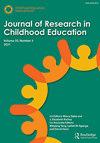父母期望与家庭素养环境——对中国-挪威双语学习者的问卷调查
IF 1.3
Q2 EDUCATION & EDUCATIONAL RESEARCH
引用次数: 1
摘要
摘要本研究考察了父母期望与中国-挪威双语学习者的汉语技能之间的关系。挪威共有118名中国家长完成了一份问卷调查,报告了他们对孩子汉语发展的期望、家庭识字环境的特点(资源和实践)以及孩子的汉语技能。这些孩子1岁;6-14;0(M=6;2,SD=2;6),在幼儿园和学校学习挪威语时在家说汉语。我们发现,父母的期望与父母报告的汉语技能呈正相关。此外,这种联系在一定程度上是儿童中文家庭识字环境的一个因素。研究结果表明,通过促进丰富的家庭识字环境(即儿童书籍和活动,如共享阅读、讲故事、听歌、与中国亲戚在线聊天以及与中国朋友玩耍)来表达期望的父母支持孩子的汉语技能。通过记录父母的努力及其与语言成绩改善的关系,这项研究为我们理解中国移民父母设定的高期望增加了细微差别,并为父母、教师和研究人员提供了启示。本文章由计算机程序翻译,如有差异,请以英文原文为准。
Parental Expectations and Home Literacy Environment: A Questionnaire Study of Chinese-Norwegian Dual Language Learners
ABSTRACT This study examined how parental expectations were associated with Chinese-Norwegian dual language learners’ Chinese language skills. A total of 118 Chinese parents in Norway completed a questionnaire in which they reported their expectations for their children’s Chinese language development, characteristics of the home literacy environment (resources and practices), and children’s Chinese language skills. The children were ages 1;6–14;0 (M = 6;2, SD = 2;6) and spoke Chinese at home while learning Norwegian in preschool and school. We found that parental expectations positively linked to parent-reported Chinese language skills. Moreover, this link was partially a factor of children’s Chinese home literacy environment. The results suggest that parents who manifested their expectations by facilitating a rich home literacy environment (i.e., children’s books and activities like shared reading, storytelling, listening to songs, online chatting with Chinese relatives, and playing with Chinese friends) supported their children’s Chinese language skills. By documenting parents’ efforts and their association with improved language outcomes, this study adds nuance to our understanding of the high expectations set by Chinese immigrant parents, and provides implications for parents, teachers, and researchers.
求助全文
通过发布文献求助,成功后即可免费获取论文全文。
去求助
来源期刊

Journal of Research in Childhood Education
EDUCATION & EDUCATIONAL RESEARCH-
CiteScore
3.10
自引率
0.00%
发文量
27
期刊介绍:
The Journal of Research in Childhood Education, a publication of the Association for Childhood Education International, features articles that advance knowledge and theory of the education of children, infancy through early adolescence. Consideration is given to reports of empirical research, theoretical articles, ethnographic and case studies, participant observation studies, and studies deriving data collected from naturalistic settings. Cross-cultural studies and those addressing international concerns are welcome.
 求助内容:
求助内容: 应助结果提醒方式:
应助结果提醒方式:


